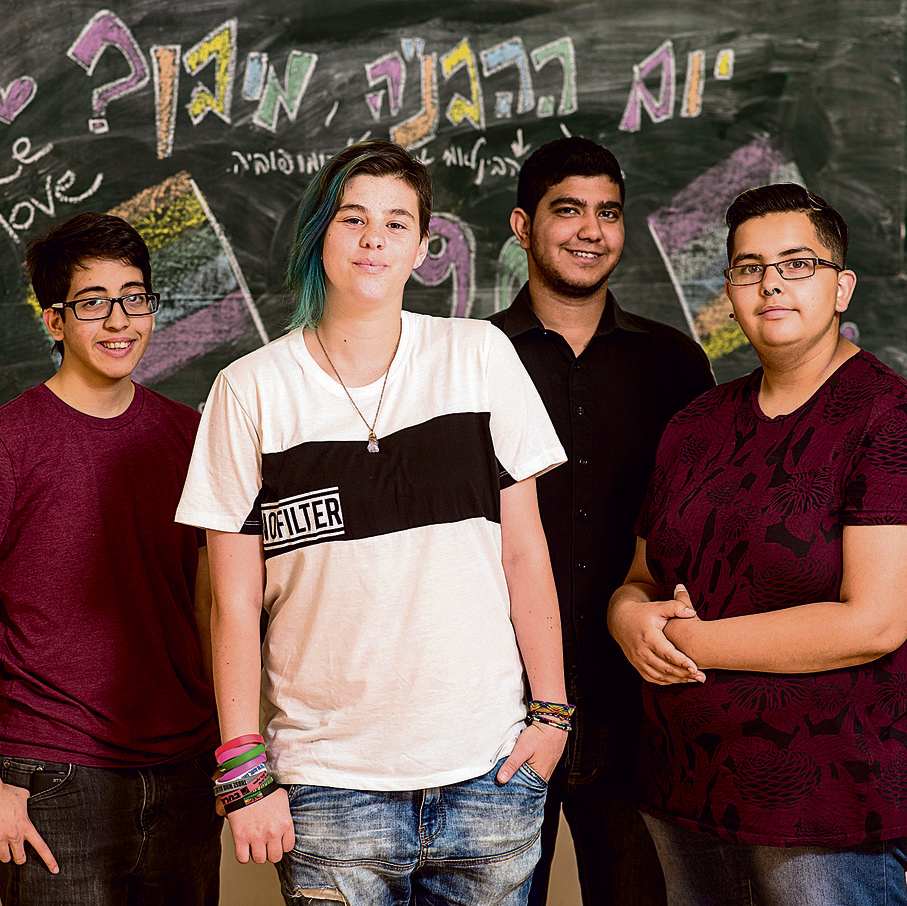
Transgenders making a difference
When it comes to serving and volunteering, young transgenders in Israel may not have it easy, but with a more inclusive policy in the IDF and a growing number of volunteer options, there is a concerted effort to get there
A year after he started taking male hormones as part of his gender transitioning process, Guy Tiram, today a 22-year-old trangender man, walked into the IDF's induction center, ready to start his service. Though he was prepared to face some level of friction, the unusual (and avoidable) harshness of the experience made it into something that to this day he remembers down to its smallest details.
"(At first) they gave me a bag full of men's equipment, and after that I went to the men's dressing room. I had prepared for this ahead of time: I was wearing boxers and everything to look like everyone else, but then one of the female soldiers in the induction center thought that there had been a mistake: Apparently, she saw noticed my information on her computer under my previous name, Sahar, with me assigned as female.
Tiram continued his story. "I was half-dressed when suddenly she came in yelling 'Is Sahar here?' And then she brutally yanked me out of the dressing room. "
"Then they took all the men's items out of my bag, gave me women's items and forcefully brought me to the women's dressing room, basically throwing me in there. The second that I went in, the girls started screaming, 'No! There's a guy in here! Get out of here!' I went out and cried for half an hour. They called an officer who came over and began yelling at me, and then finally they found a place where I could change privately. It was just terrible, a terrible feeling of humiliation."
From the induction center, Tiram continued to basic training in the mixed-gender infantry battalion Caracal, where he joined friends he had made during his national service year (an optional pre-army year of volunteer work and went through a completely different experience. "My crewmembers had my back whenever anyone dared to say anything unacceptable about me. My commanders also knew how to handle it."
Tiram spoke at length about the support he received in his army unit. "When things got hard for me, my commander would say, 'Now you listen to me: We're going to sit here every day for half an hour, you're going to tell me what isn't working out, and then we'll figure it out together. ' There was that, and also funny comments from the other guys, who would say things like, 'Wow, you get to shower with the girls, you to see that one or that one naked.' I was the star of my unit, and it in hindsight it helped me build up this whole trans thing. My social life really blossomed there."
Despite receiving support from his friends and commanders, after four months in uniform, Tiram decided to leave the army. "The people around me didn't care if I was a guy or a girl, but it did matter under the army's rules and system," he said. "My service became a burden, mainly because of the sleeping arrangements. The army didn't know how to deal with it. I was drafted as a guy, and I referred to myself as a guy, but I still had to sleep in the girls' barracks."
And did the women agree to that?
"They didn't have a choice. Nobody asked them. Both the men and women wanted me to be able to sleep in the men's quarters, but it wasn't possible. In the beginning, before everybody knew about me, there were comments like, 'Look, this is the girls' barracks; what are you doing here?' I felt uncomfortable, like I was invading their personal space. Al that without even going into the difficulty of being a combat soldier, far from home, spending 21 days straight on base."
Since then, the IDF has made a significant leap forward in its approach to transgender soldiers, implementing more advanced policies. Tiram himself said that if he had been drafted today, he would have been allowed to sleep in the men's barracks.
A source at the IDF Manpower Directorate explained that the army is putting a lot of effort into integrating transgender soldiers into a variety of units, bases and positions, adding that the IDF encourages them to enlist and tries to answer their questions in special meetings held on the related issues. A central figure in this effort is Deputy Women's Affairs Advisor to the Chief of Staff, Lt. Col. Limor Shabtai, who works with civilian organizations that also offer support to transgenders, while providing her phone number to anyone who wishing to speak to her on the matter.
Currently, there are 60 transgender soldiers serving in the IDF. One of them, who is now a captain, began his service as a woman, going through officers' training and eventually returning as a man to his unit.
"In principle," said an IDF representative. "There's no reason why transgenders can't serve in such positions as pilot or in the Shayetet (an elite naval unit). What happened to Guy is a thing of the past. These days, even combat units understand that you can go through a sex change and remain in the army."
For Tiram, the IDF reform came too late, but he did find an alternative. After his discharge, he looked for another setting that would allow him to contribute to society, and he ended up in national service. The Shlomit Foundation, which takes steps to educate its volunteers about the gender spectrum, set him up with the LGBT youth organization IGY (Israel Gay Youth), where he is now a counselor for transgender youth, whose job includes creating educational content for them.
Along with 14 others, Tiram has been participating in the Trans-Breaker program, which guides transgenders through their national service. Five additional transgenders are alumni of the project. Thus, another door for transgenders has been opened.
Tali Wasserman, the founder of the Trans-Breaker Project and the Tel Aviv secretary for the Shlomit Foundation, explained what had initiated the project."We started it after trans people began coming to us and saying that they wanted to do national service. At first, we said we'd start with a pilot and search for trans-friendly places. There are places that tell us, 'Of course, of course we'll be able to include transgender people,' but in the end, they can't. Sometimes, third parties such as technicians use the wrong pronoun, which can make them feel inadequate. There's also a large hospital in the center of Israel that won't even accept one trans person to join their ranks; Apparently, they feel that having a transgender receptionist isn't presentable enough."
We meet at Tel Aviv's Gay Youth Center. In addition to Tiram, there are Adi Ben-Barak, Alex Gal and Eden Ziv. Out of the whole group, three have decided to serve in the army.
Ben-Barak explained his own approach to the army. "When I got my first subpoena, I made sure that I would get to see an IDF mental health officer. After I explained to him that I was trans, he asked if I think I can serve, and I told him no. That said, I still wanted to do national service."
His experience in national service hasn't all been positive, though. At the first place he was sent to, people were less than understanding. "I got all kinds of responses: 'Are you a boy or a girl?' 'Why don't you put on some make up?' 'How about a makeover?' I was a real outsider."
Eventually, things became so bad that Ben-Barak sunk into a depression. Fortunately, though, things turned around for him. "Unlike the army's strict way of doing things, I managed to move, which was how I ended up continuing my service year at Ma'avarim, an organization for the promotion of transgenders."
Gal, who is Ben-Barak's roommate, has only recently joined the Trans-Breaker program. "I always felt that I wouldn't be able to serve n the army," he said. "I'm a pacifist, a vegan, and I assumed I wouldn't do well in the IDF because of my gender." When he didn't find a position that felt right for him, he decided instead to volunteer for National Service, believing that it contributes to the country in a way that is "even greater than the army."
Ziv was among the project's first crop of volunteers. He recalled the positive reactions he received as a kindergarten aid both from the parents and the children. "Kids don't see gender," he said. Their thinking only begins to harden around age six, so if you tell them that someone's a boy, he's a boy."
"There was this one boy," he said. "Who would always refer to me as a boy, telling me he loved me while using the male pronoun. One day, after he had already graduated from kindergarten, he told his mom he wanted to come by and say hi to me. When his mother told him that 'She doesn't work there anymore,' he corrected her to 'he'. I was so touched when she told me that."
Usually, those doing their national service are sorted into apartments by the gender they were assigned at birth, but with transgenders it is not so simple. For this reason, the Trans Breaker Project places transgenders with other transgenders. "Being in a likeminded environment helps," admitted Ben-Barak. "When I got my first hormone prescription, my roommates threw me a party with snacks and everything, and it was one of my roommates who taught me how to give myself my first shot."
As opposed to other options available for national service, where those in charge of the young volunteers visit them once a month, coordinators at the Trans Breaker Project make sure to visit more often and offer its transgender participants all the support they need, as they transition not only from one gender to another (or somewhere in between), but from adolescence to adulthood. They receive practical guidance over matters big and small, including résumé writing, filling out government forms and setting up a bank account.
"Have you any idea how hard it is to go somewhere and have to explain that 'Inside, I feel like a man?'" said Wasserman. "Or insist that you be body searched (for security) according to the gender you have chosen for yourself? What we're trying to do here is use their time in national service to gain work experience, improve their communication skills and become more assertive."
Wasserman described the how the project manages to touch not just the participants but also the staff. "Seeing them change before our eyes definitely brings us to tears. Each time they look a little different, a bit more like themselves. It can really move you."











